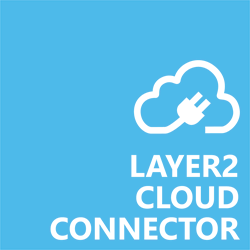Get a free trial version of the Layer2 Cloud Connector after a short registration
Feature comparison of Microsoft OneDrive Sync Client versus Layer2 Cloud Connector
While the Microsoft OneDrive for Business document synchronization client is a free tool for end-users, the Layer2 Cloud Connector offers advanced features as often needed to solve typical business requirements with Microsoft cloud data integration, file migration, backup, or synchronization. Find a comparison of the OneDrive Sync Client and the Layer2 Cloud Connector in the fact sheet below.
Features | Microsoft OneDrive for Business Client | Layer2 Cloud Connector |
|---|---|---|
| Business requirements solved | Keeps pre-selected OneDrive for Business documents in sync with local drives. | Keeps pre-selected files and data sets in sync across 100+ IT systems and apps, cloud-based and on-premises. |
| Audience | End Users | IT Administrators, Consultants |
| Where to run | Runs client-side on the user‘s computer in the system tray or on mobile devices. | Runs server-side centrally in the corporate network or cloud as a Windows Service. |
| How to run | Runs automatically on data changes, but the user must be logged in. | Runs scheduled or on-demand in the background as a Windows Service with no user logged in. |
| What to sync | Manually selected OneDrive for Business libraries or folders on local disks. | Folders, files & structured data via ADO.NET Data Providers connected by connection string and flexible data query, such as SharePoint Views, SQL, OData, Xpath. |
| When to run | automatically | Flexible scheduled sync interval per connection. |
| Sync on-demand | No | Yes, per command-line or API. |
| File | No, you can't add a network or mapped | Yes, sync folder location can be set to a network drive. |
| Azure File Share support | No | Yes |
| SharePoint to SharePoint sync support | Depending on versions/releases. | Yes, including across versions, tenants, sites, site-collections, online and on-prem. |
| Support for SharePoint on-prem and older SharePoint versions | No | Yes, starting with SharePoint Server 2010 including SharePoint Foundation |
| Authentication and accounts | Current user context | Different authentication methods and users per end-point and connection. |
| Administration, Logging & Alerting | Interactive/Tray, Windows Event Log. | Windows MMC/XML/PowerShell, NLOG to file, SQL, Windows, E-Mail |
| Amount of files or records | 5.000 / 20.000 / 100.000+ documents per library, depending on release (List View Threshold). | No hard limit regarding the number of items and documents to sync. Becomes less effective with more than 100.000 items per library. |
| Selection of document set to be synced | ||
| Provisioning (automated setup of connections) | No | via scripting (all connections are just XML files) |
| Backup / Migration Option (One-Way Sync) | No | Yes, flexible sync options (such as no-insert, no-update, no-delete) and optimized data providers for different requirements (e.g. speed vs. features). |
| Metadata management | No | Yes, field/column auto-mapping or manual. Can add custom metadata via C#. |
| Data cleanup, cross-system translation, transformation, and custom business logic | No | Yes, via C# and Dynamic Columns |
| Sync conflict-resolution options | Interactive by end user | Pre-defined conflict resolution rules per connection, such as "one side wins", or "keep both files". |
| Systems and apps to connect and sync | SharePoint / OneDrive libraries, local disks, (supported systems highly depending on client release version). | SharePoint 2010/13/16, SharePoint Online lists and libraries, OneDrive4B, Office 365 Groups, Microsoft Teams, Dynamics, Exchange, Azure, local disks, file server shares, home drives, almost any SQL database, Access, Excel/XML, Text/CSV, OData, SOAP, ERP/CRM, 100+ more |
| Known restrictions and limitations | See here | Depends on restrictions of the connected systems. |
| Operating Systems | Runs on Windows, iOS, Android | Windows only (32/64-Bit) |
| Costs | cost-free | Free edition with limited features. License costs depending on the edition. Licensing per installation. No additional costs for the number of users, tenants, connections, or data volume. |
Summary
The Layer2 Cloud Connector can help to solve usual needs, but also more complex business requirements in the field of Microsoft cloud file migration, backup, and synchronization. Compared to the free Microsoft sync tool, the Layer2 connector can add additional value by providing advanced integration features, flexible sync options, and its support of structured data sync to keep hundreds of IT backend systems and apps connected and in sync with Microsoft Office 365.
In case of the specific requirement to keep existing folders on local file servers, network shares, or NAS devices centrally in sync with SharePoint libraries, the Layer2 Cloud Connector is a must-have to meet these requirements.
Explore frequently asked questions by topics.
Take the next steps

